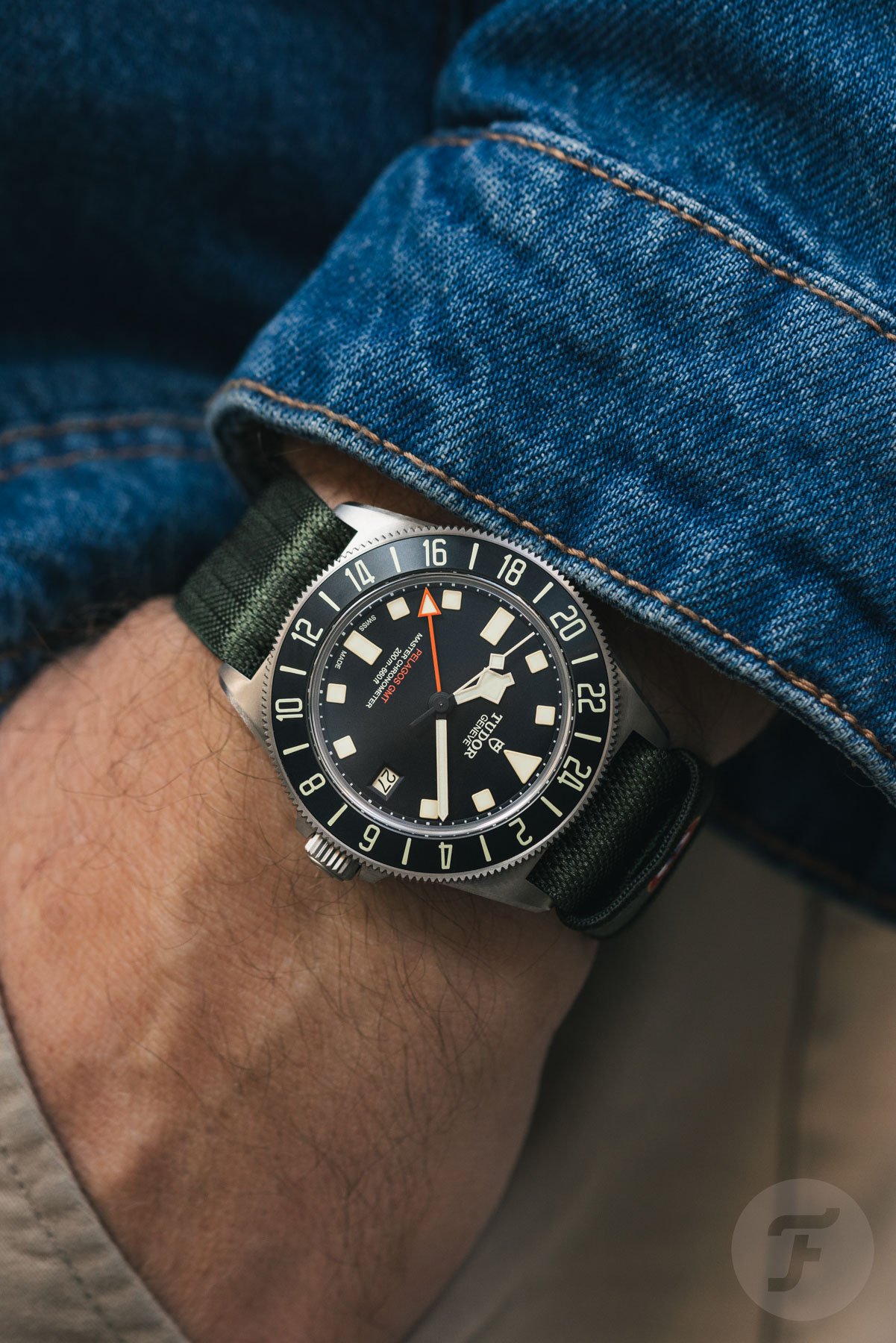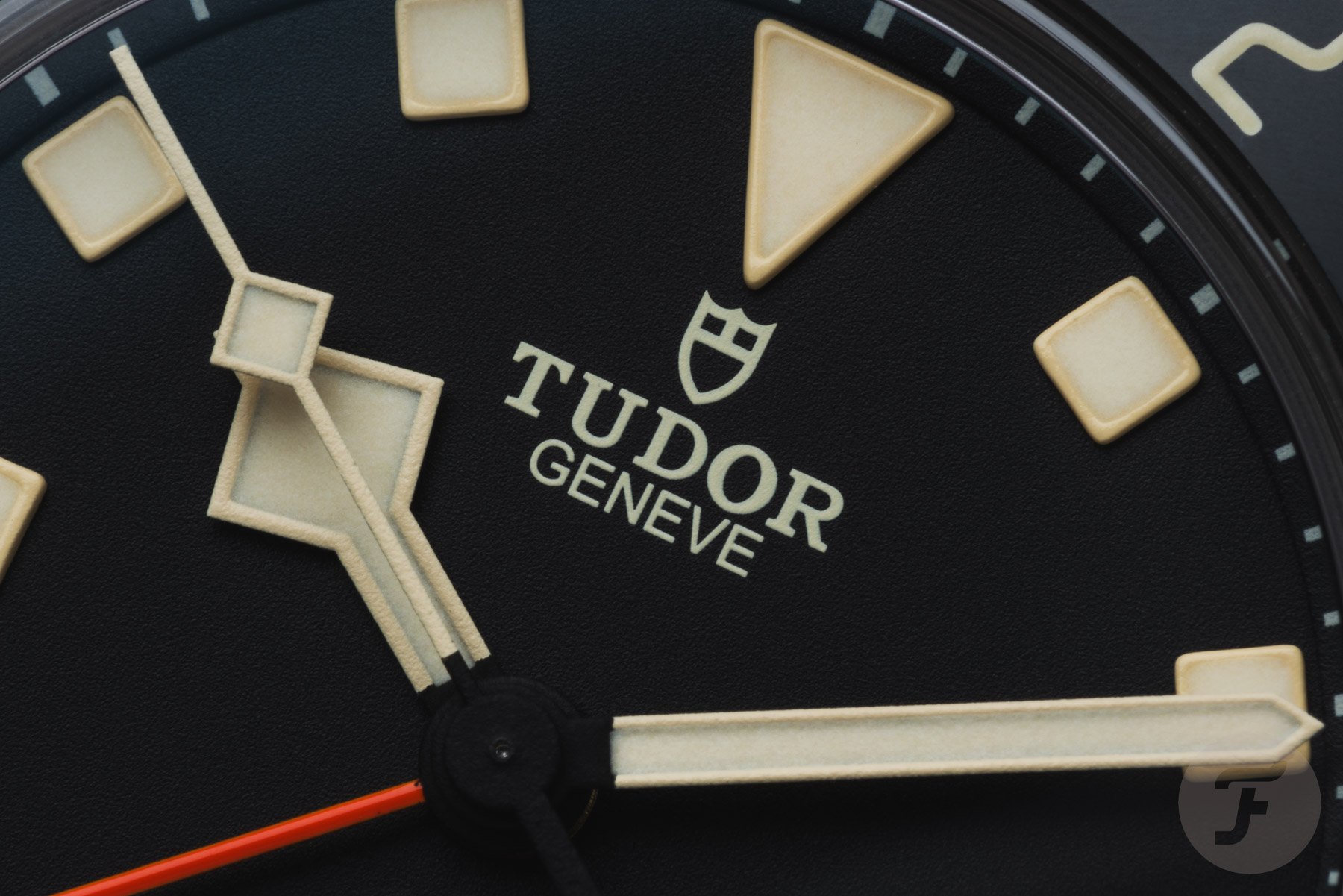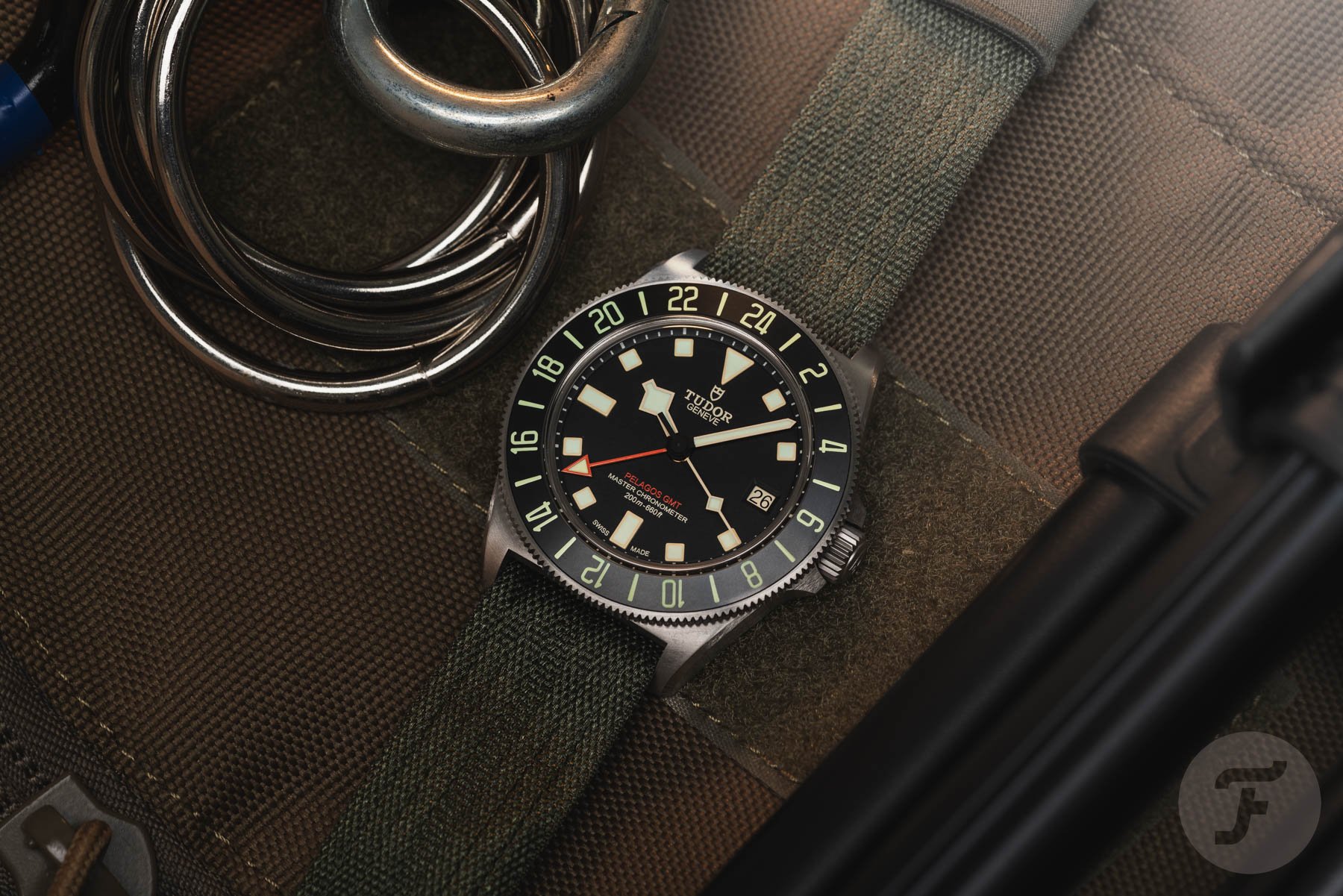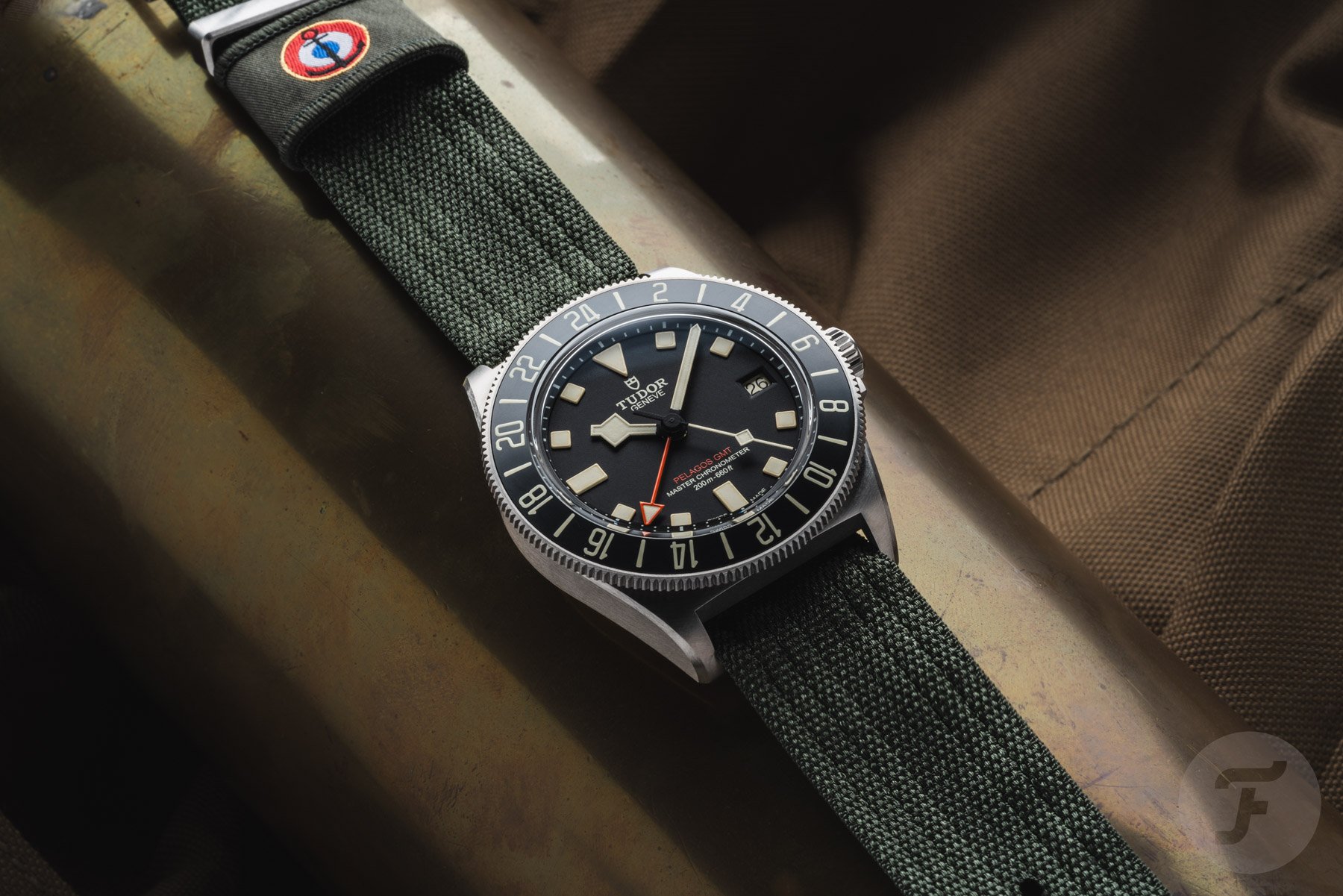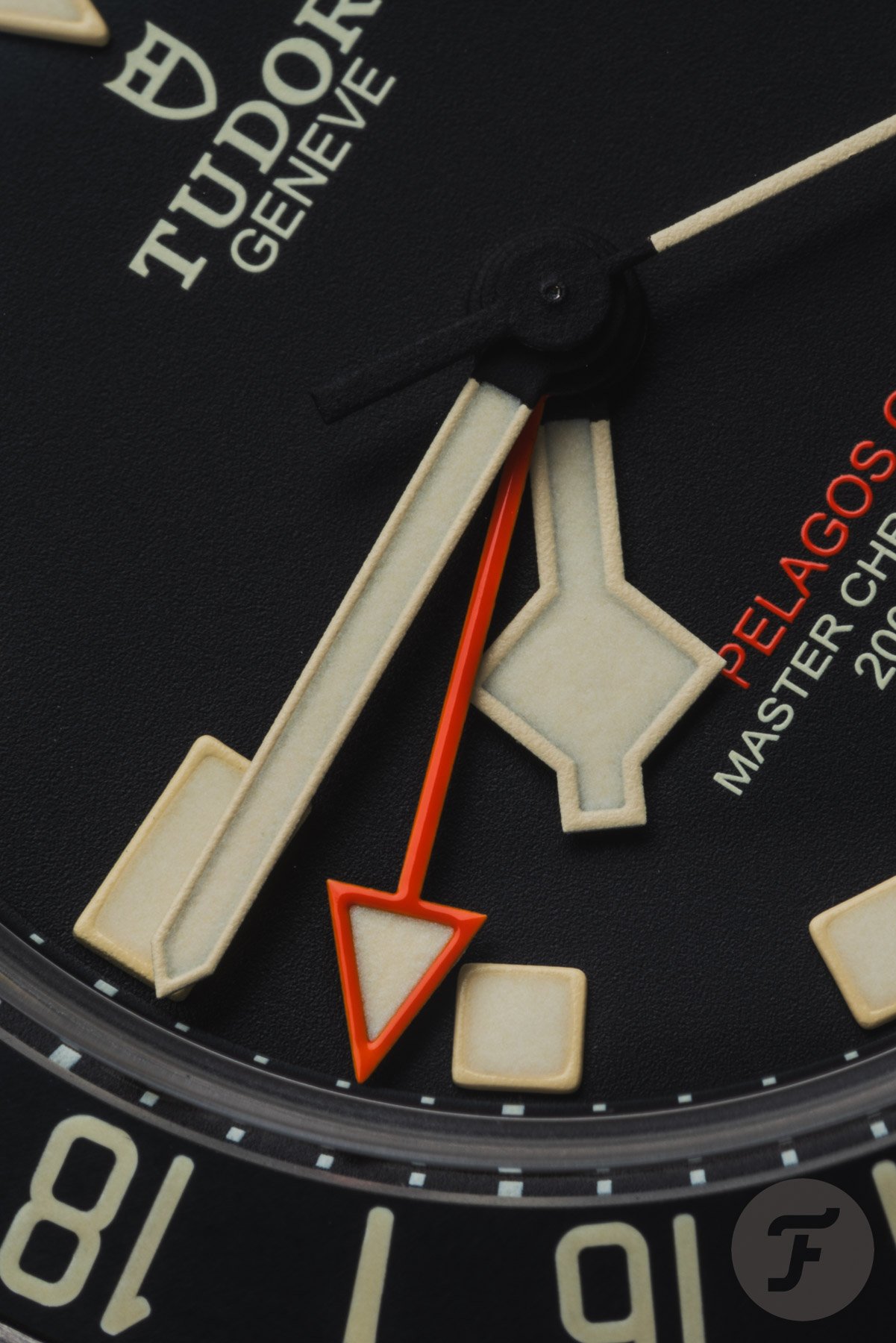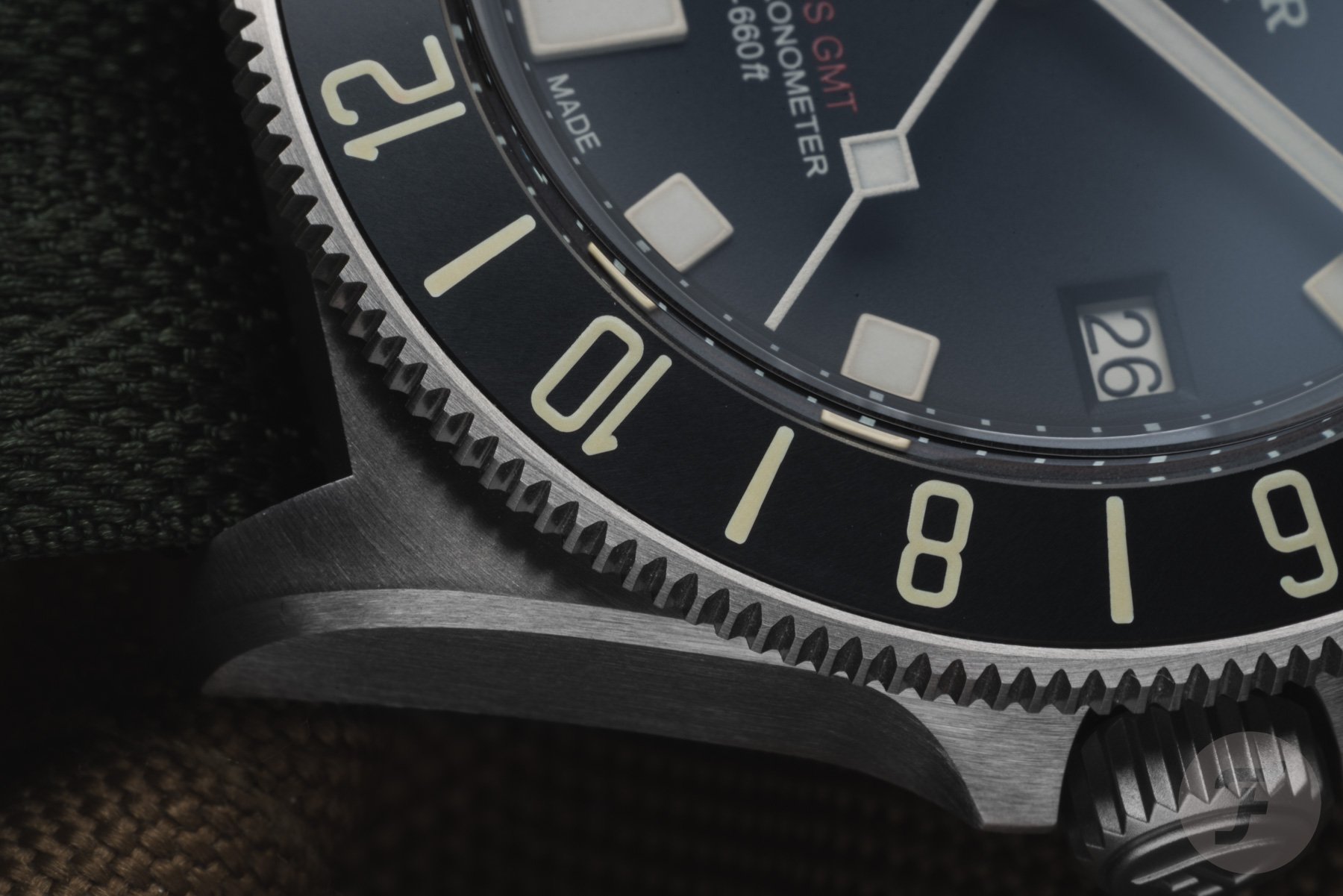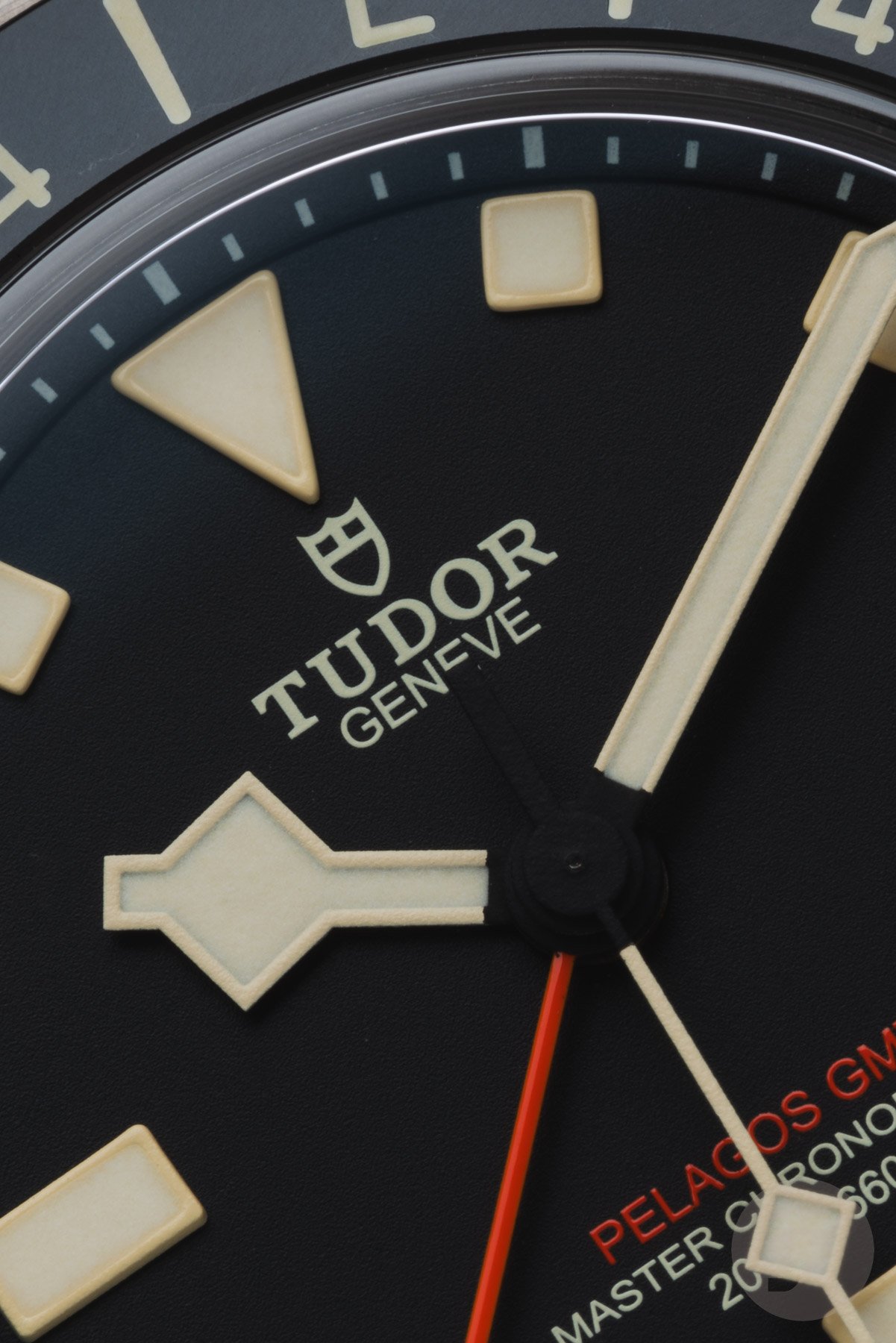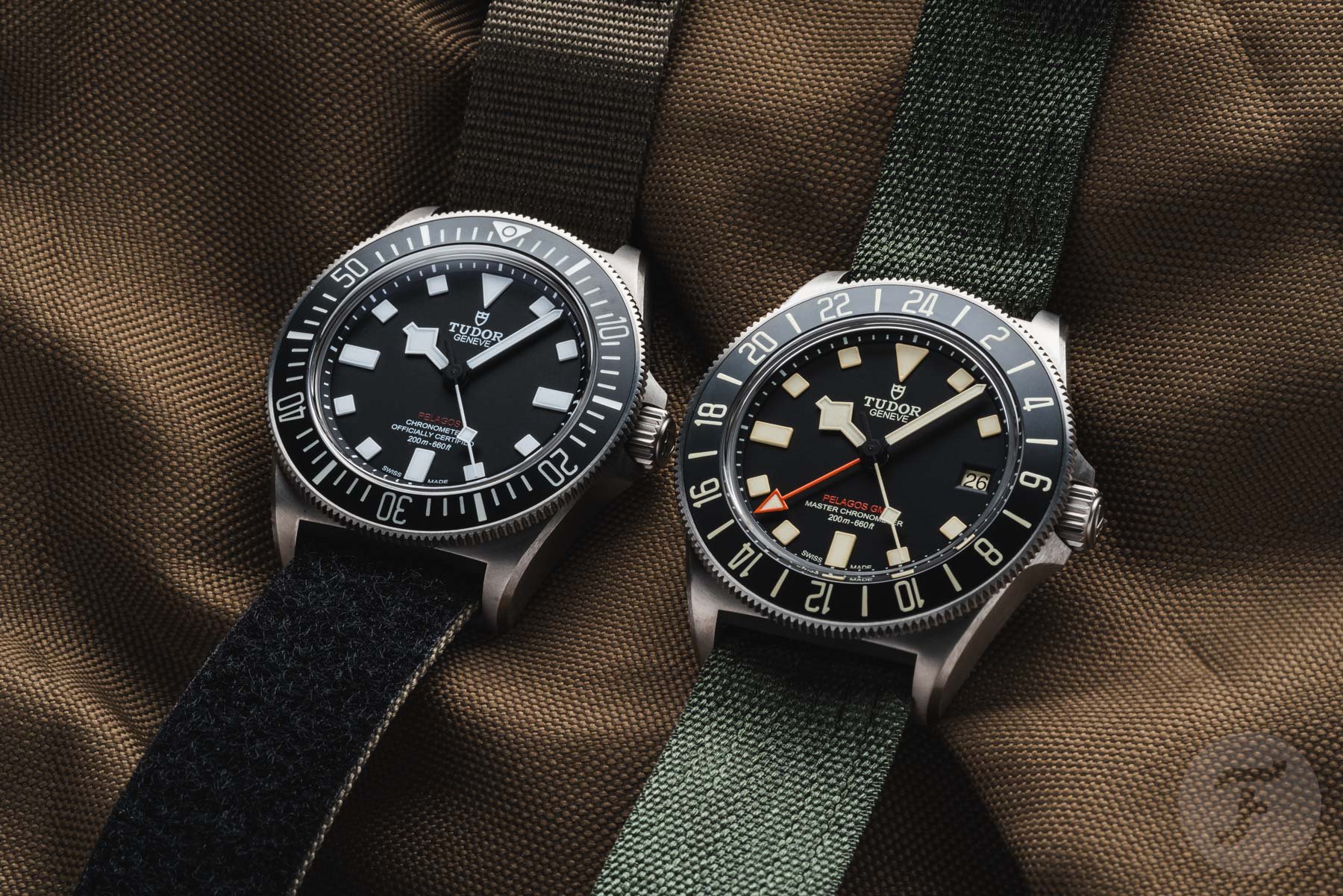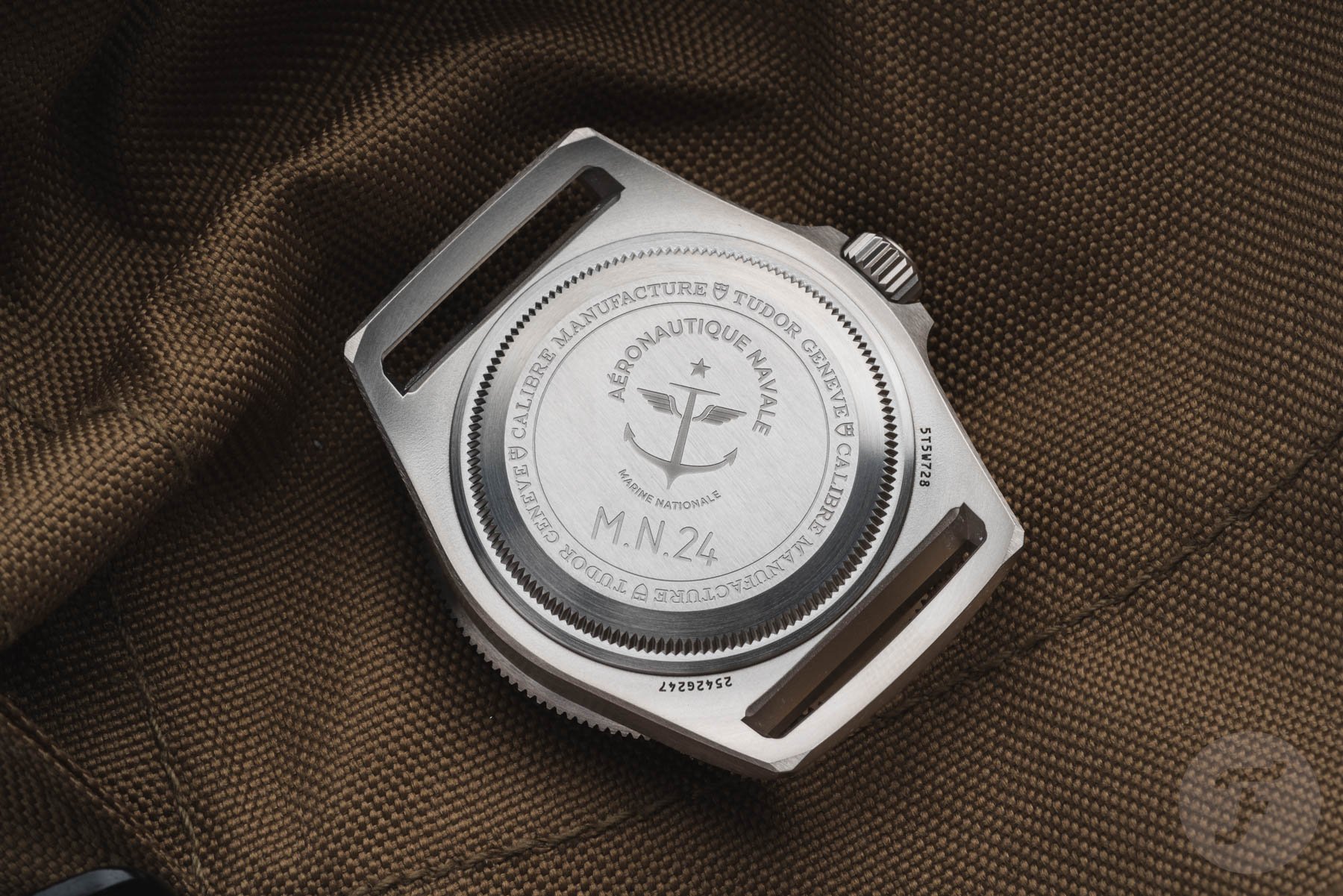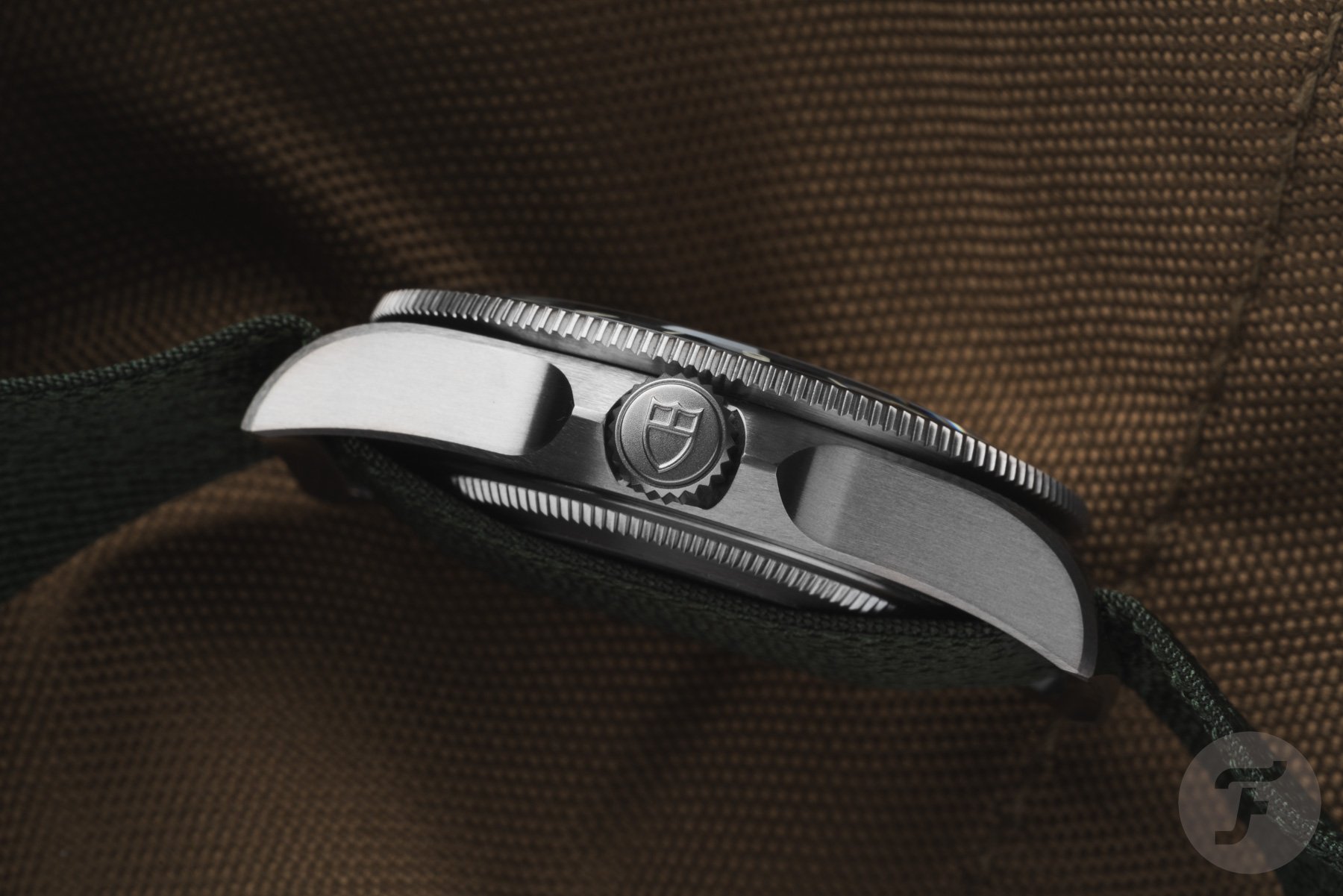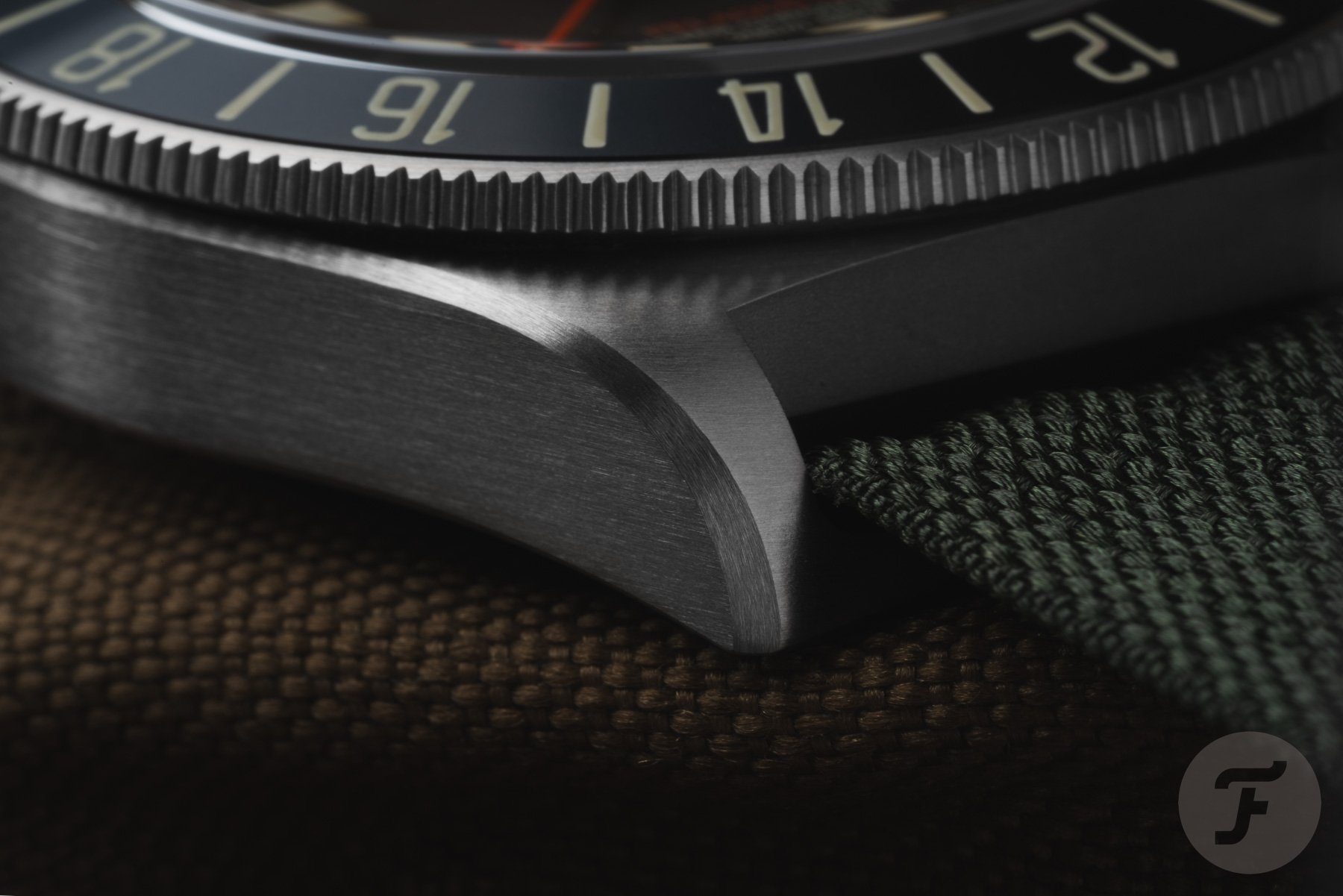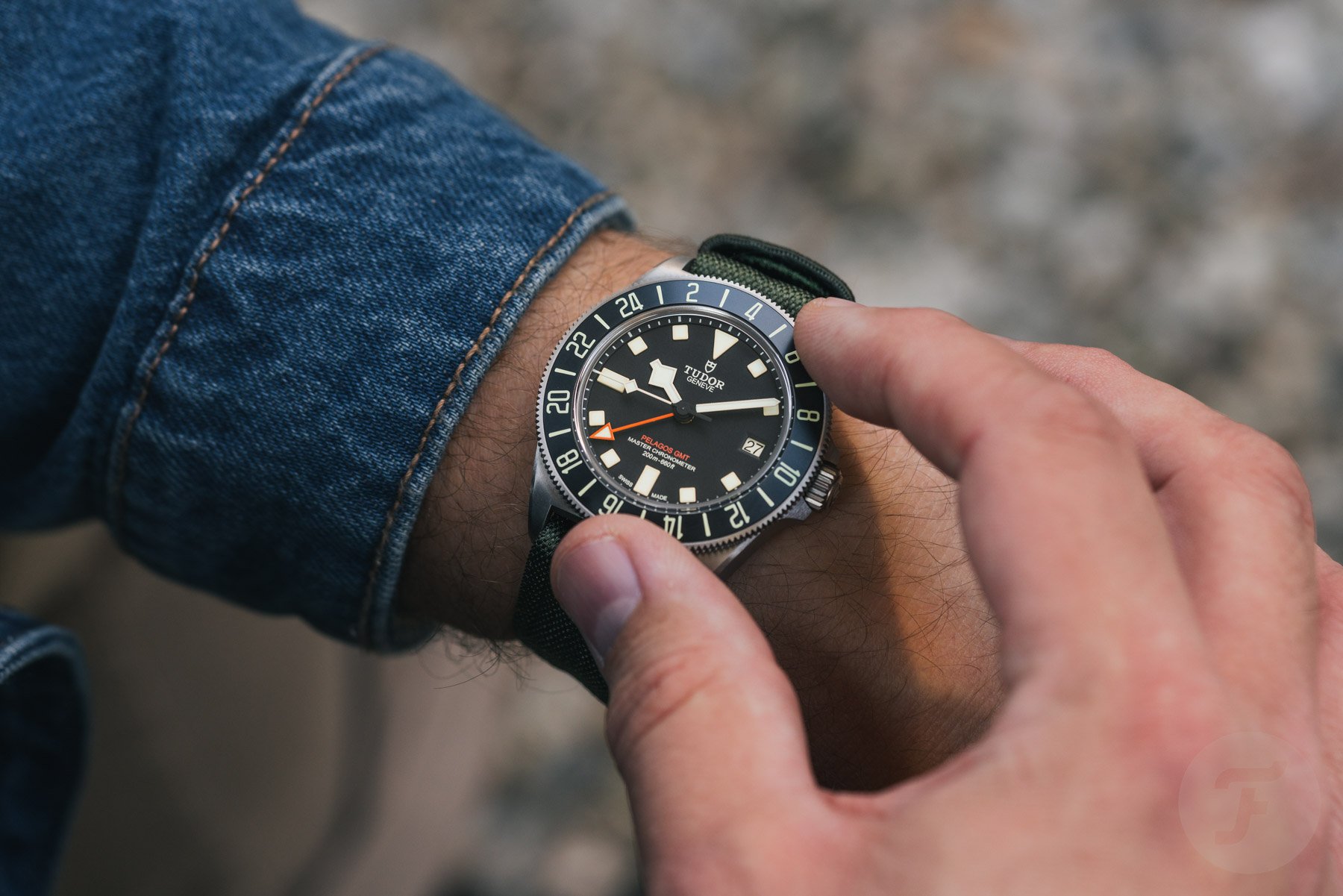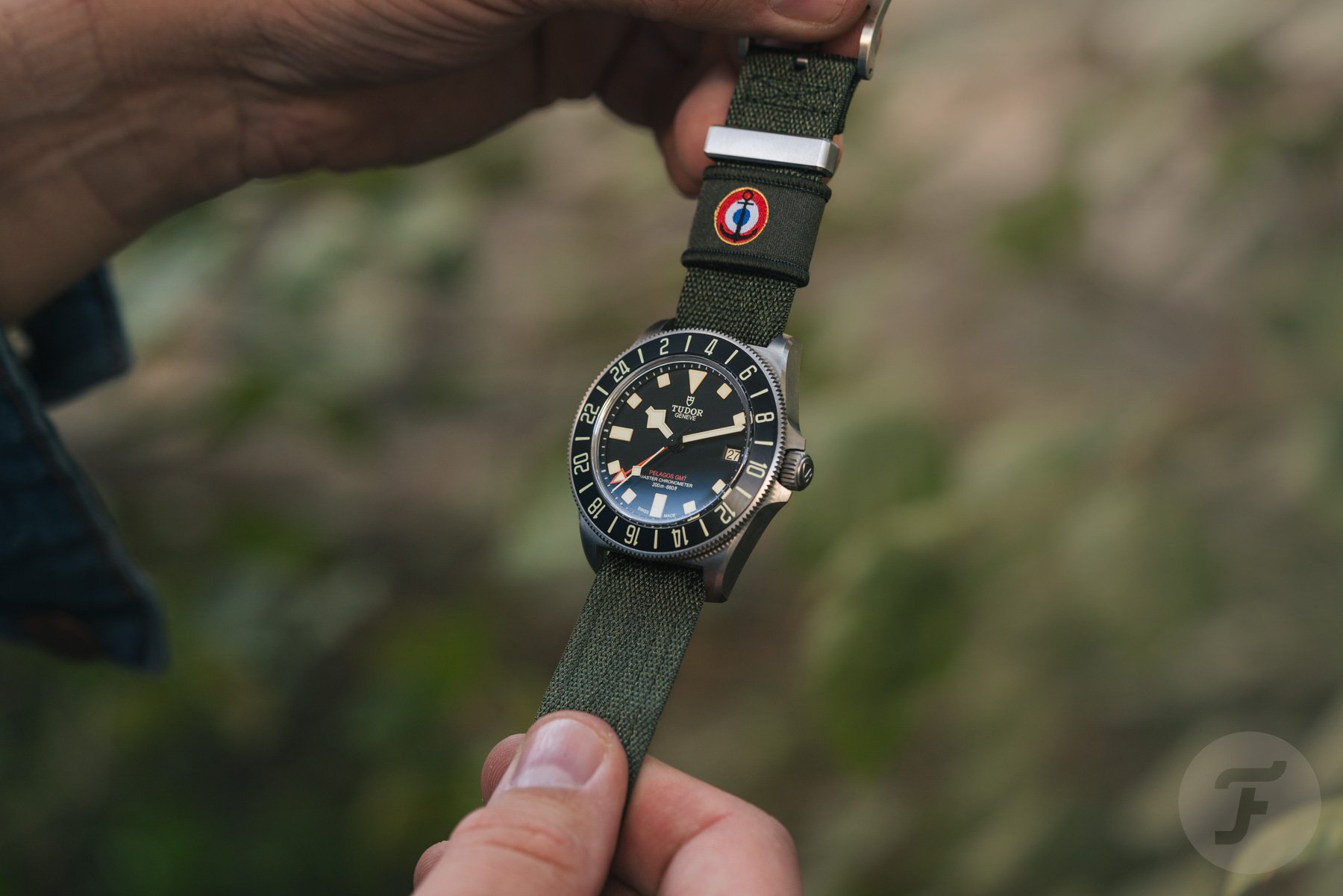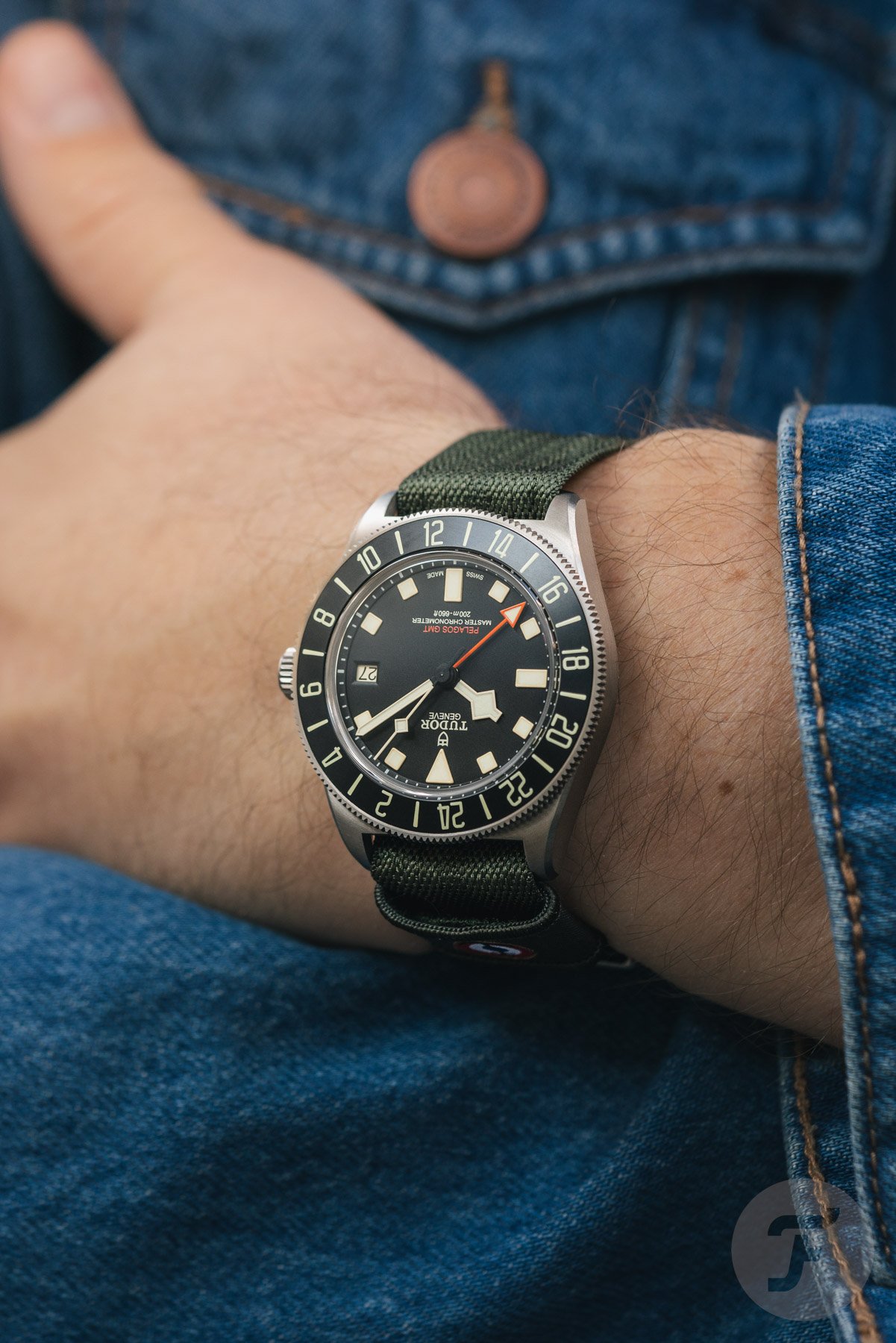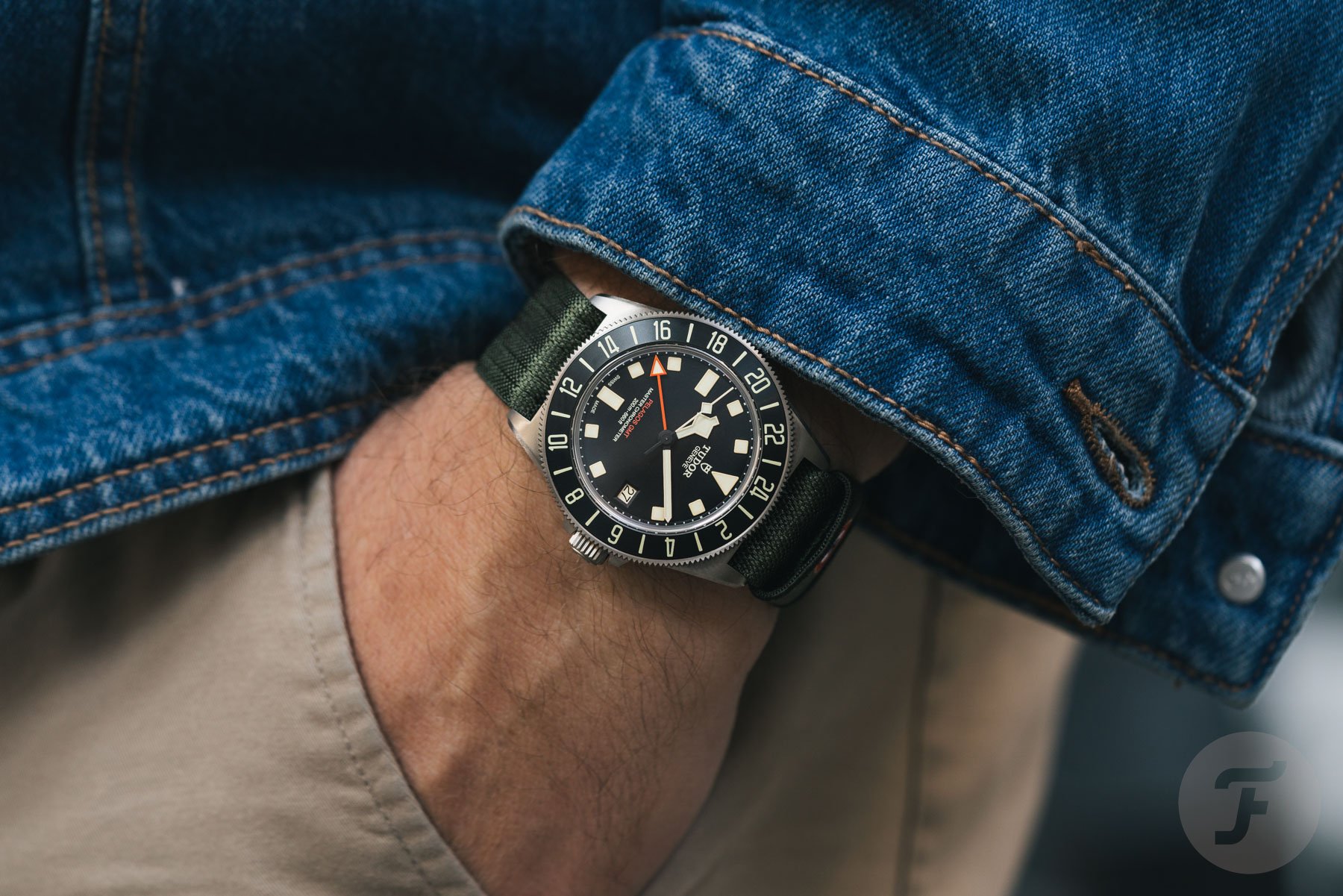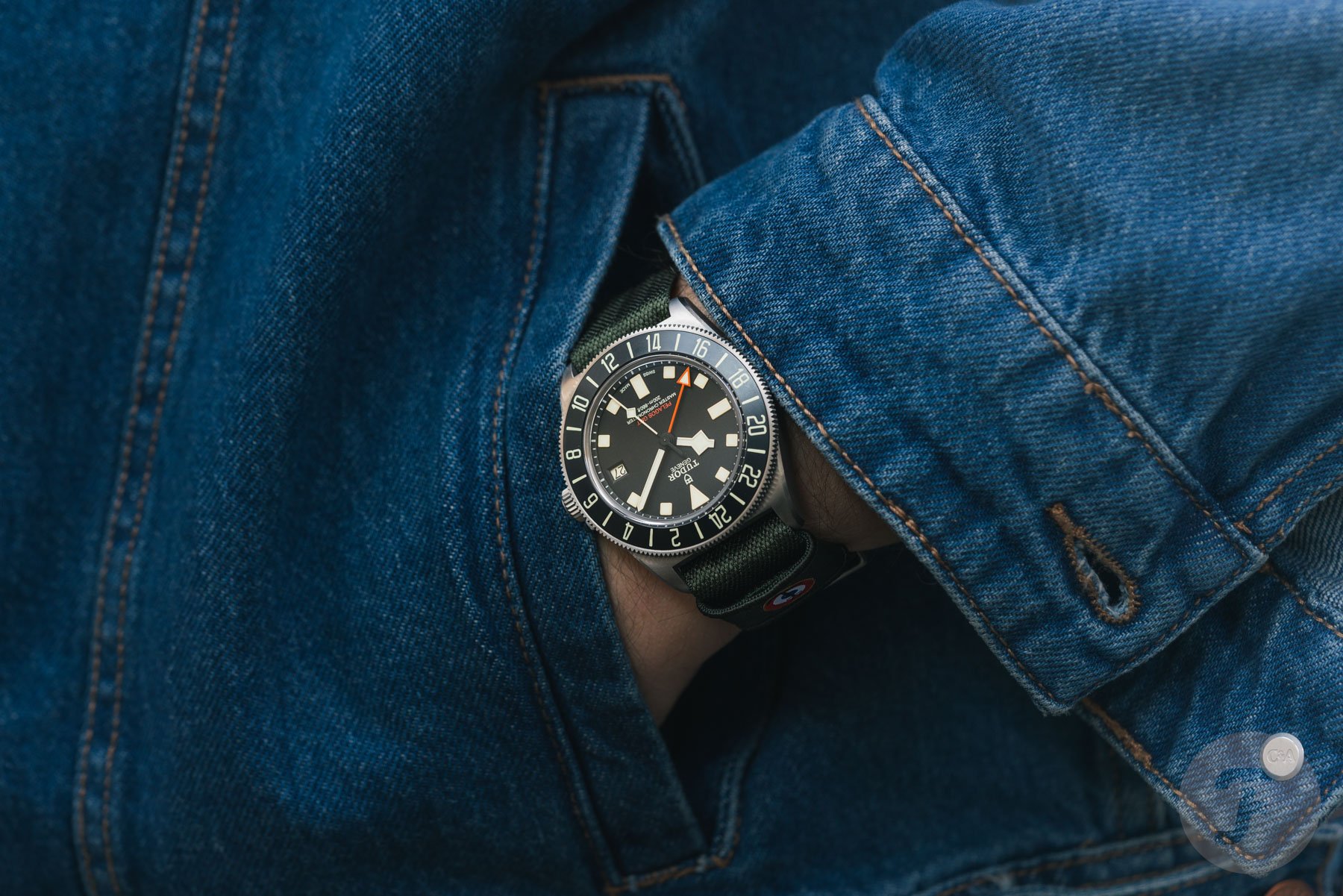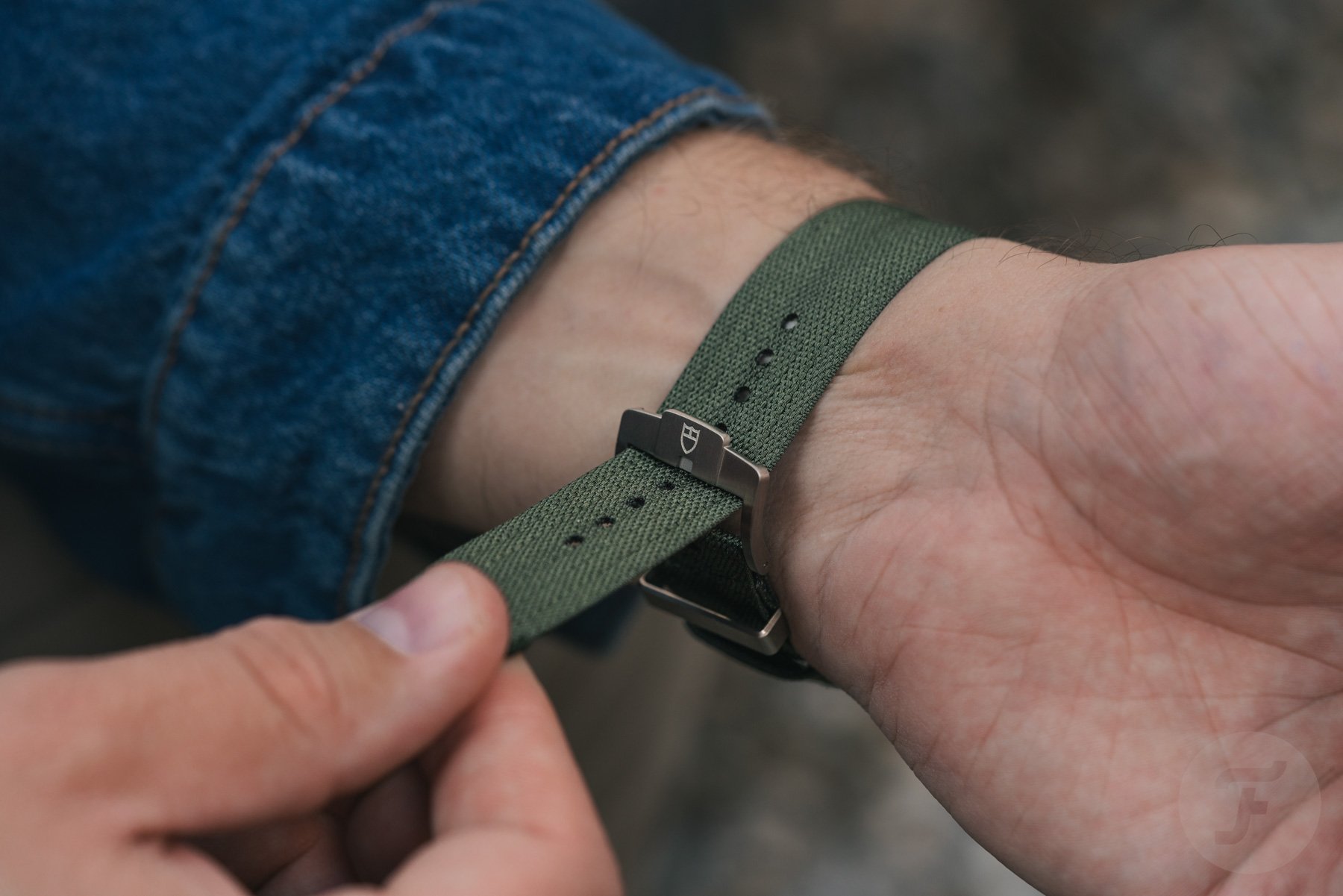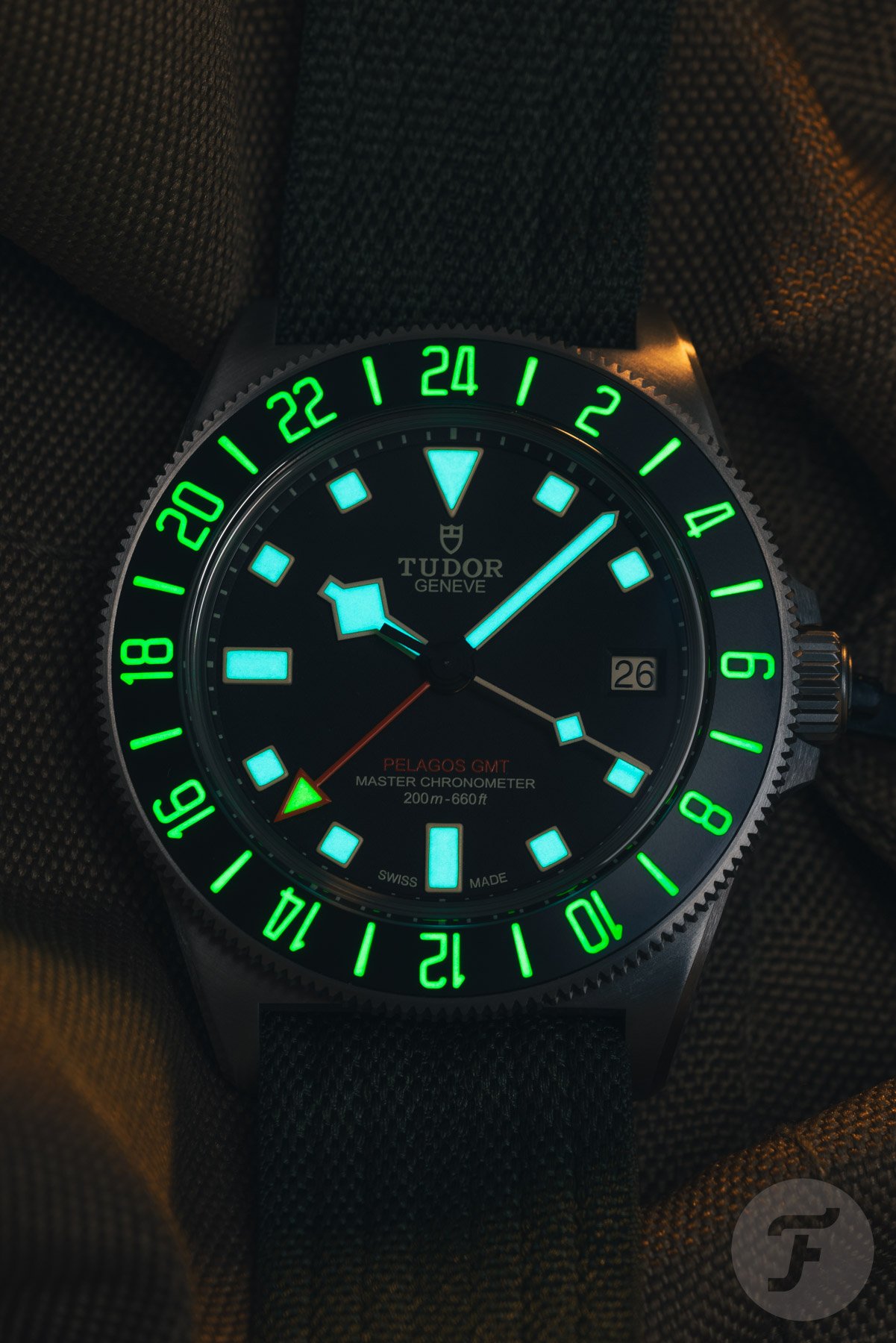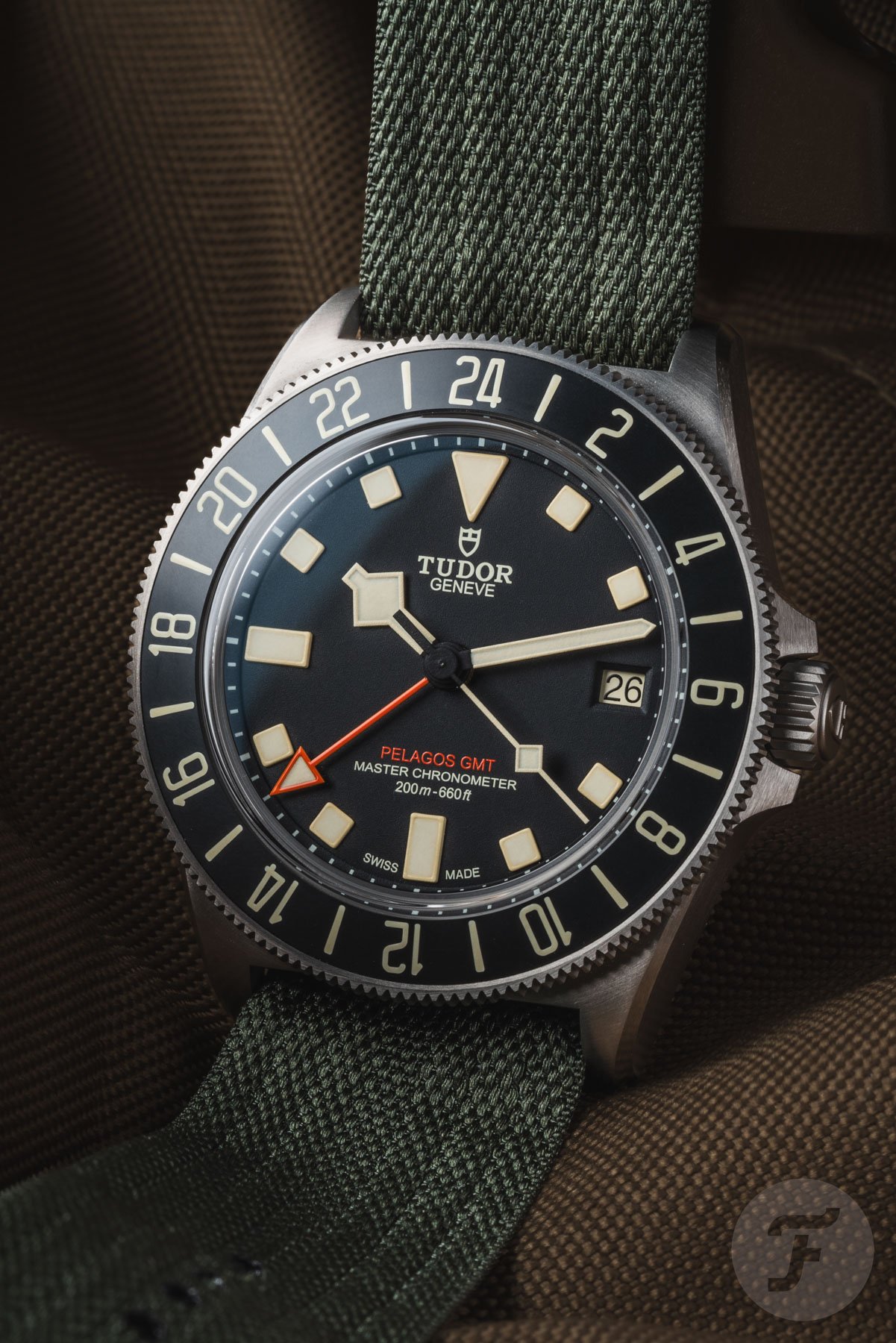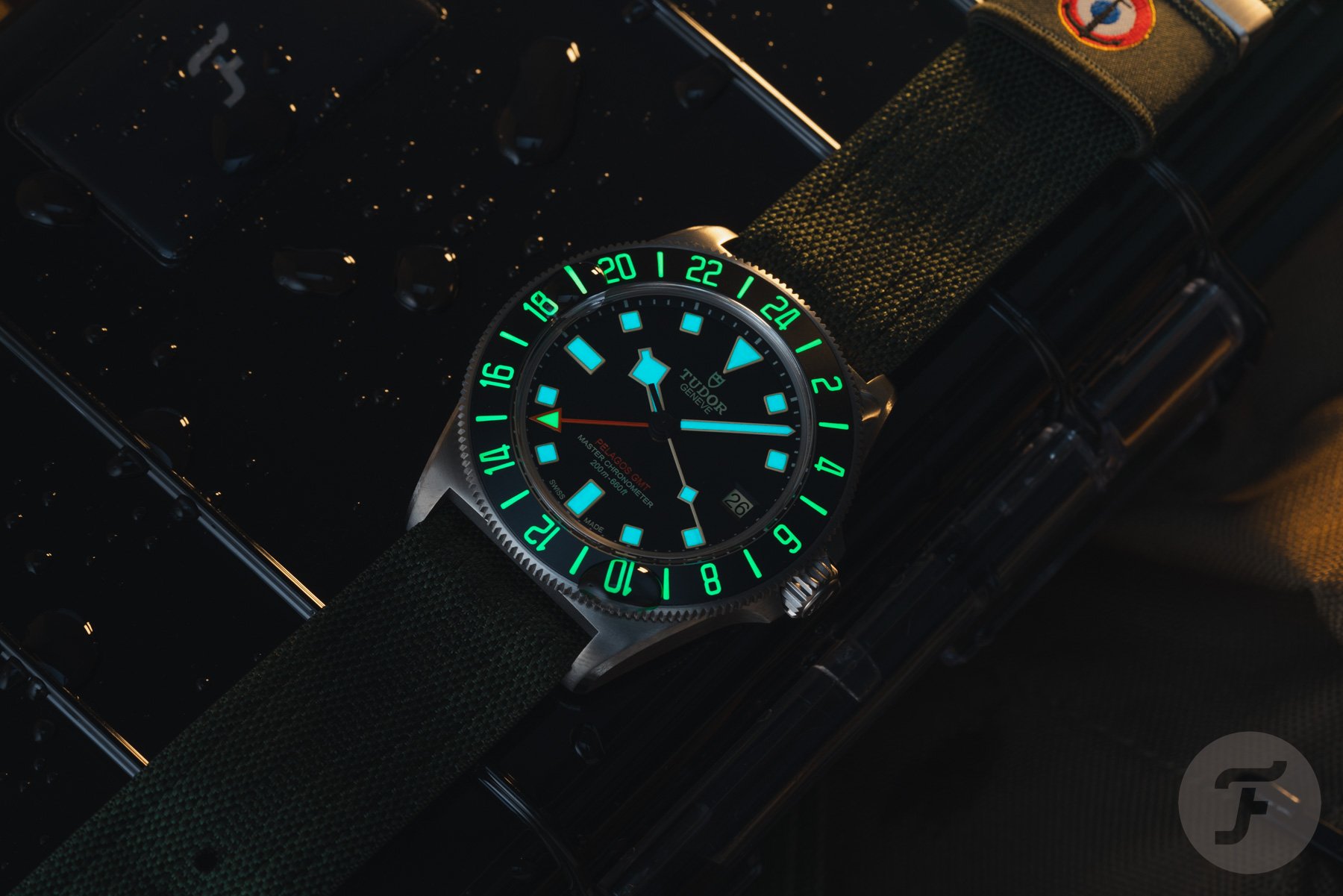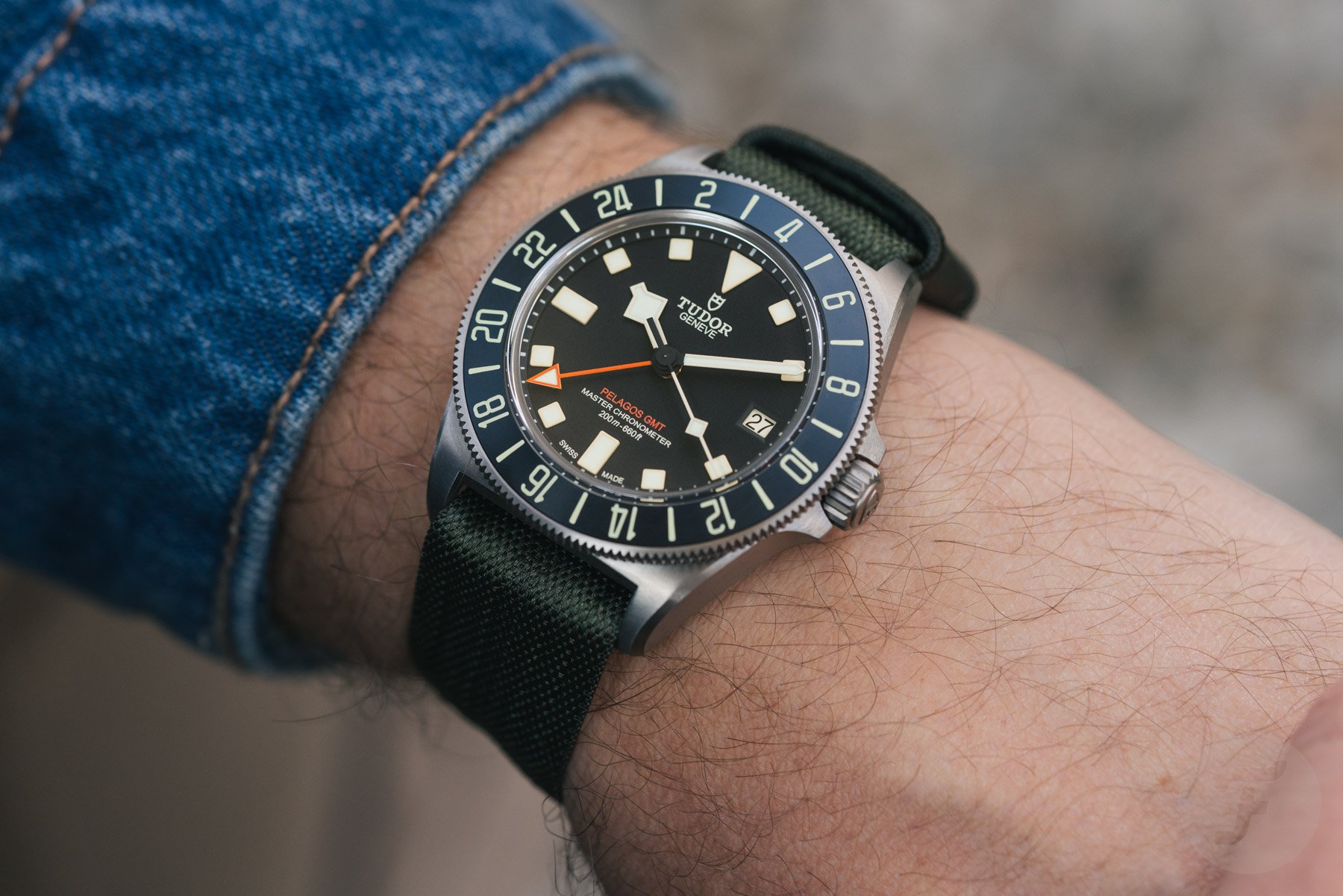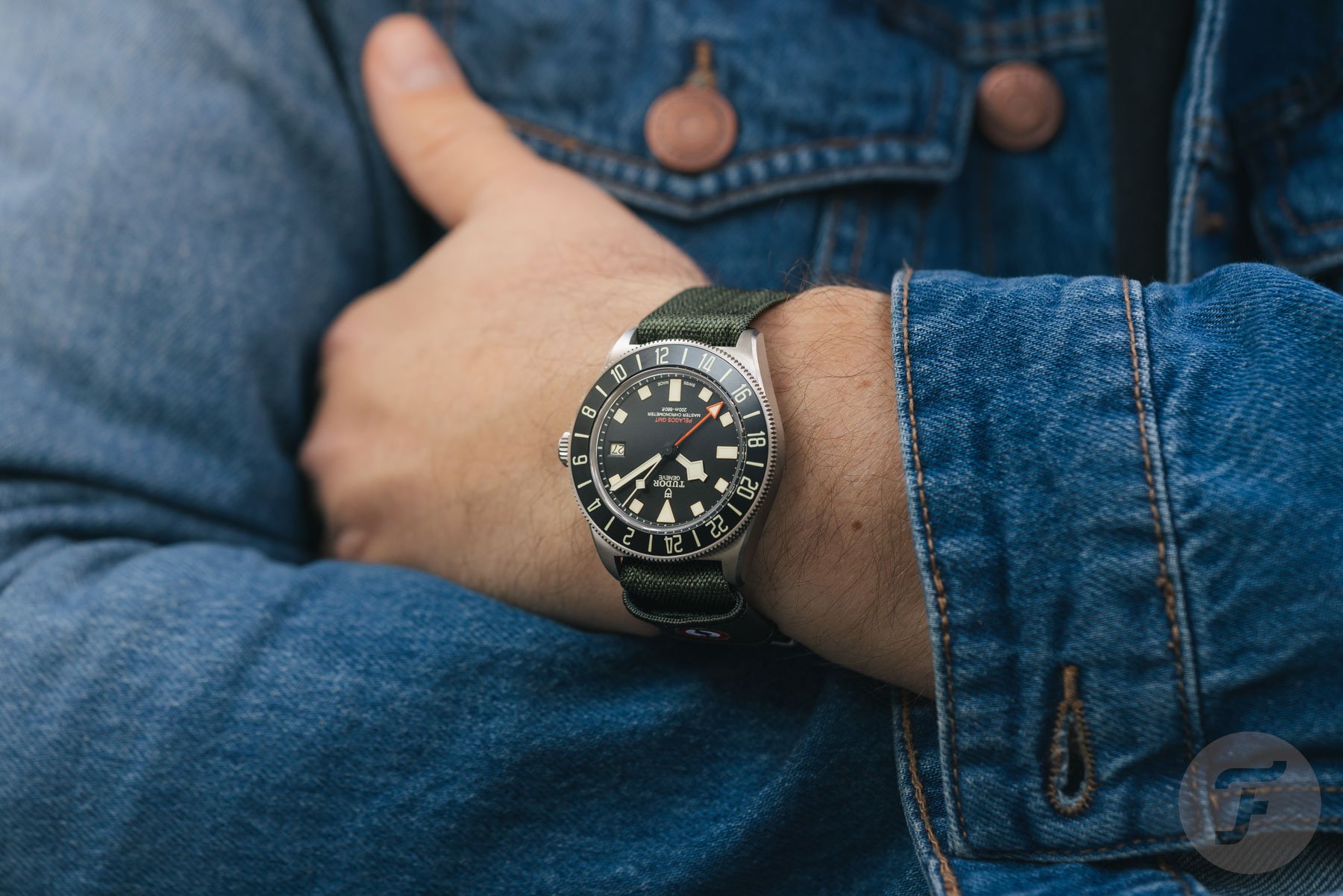Hands-On With The Adventurous Tudor Pelagos FXD GMT “Zulu Time”
When Tudor hints at a new watch, the rumor mill starts running on overdrive. Usually, it sparks discussions about great possible additions to the Tudor lineup. How about that for Tudor scooping up ideas for future releases? But this time, the teaser that Tudor released wasn’t too mysterious. With a clip that showed the Marine Nationale’s Aéronautique Navale pilots and the words “Zulu Time,” the assumption that it would be a Tudor Pelagos FXD GMT was rather logical. But there was still much left to take in once the Tudor Pelagos FXD GMT “Zulu Time” was finally unveiled. Now that the dust clouds have settled and I’ve spent time with the watch, it’s time to provide some perspective.
Over the past three years, I have been surprised by the many Pelagos FXD models that Tudor chose to release. The brand added one new regular Pelagos model to the lineup with the Pelagos 39. The Pelagos FXD line, however, currently consists of six models released since November 2021. Five of those have been collaborative efforts with the Alinghi Red Bull Racing team, the Tudor Pro Cycling Team, and the Marine Nationale. In general, collaborations are not a reason for me to get more excited than usual about a release. But when it’s with the Marine Nationale, it’s about so much more than just a collaborative effort with another party.
The sentiment behind the Tudor Pelagos FXD GMT “Zulu Time”
As most of you know, the French Navy’s divers played a pivotal role in developing the famous Tudor style. Without them, we would not have the classic Submariners with Snowflake hands and dials with oversized square and rectangular markers. Fans consider this design the true Tudor style, which is also why many people feel that the real heart of Tudor lies in the Pelagos line.
I do not necessarily agree with the latter because I feel that the classic spirit of Tudor’s past is in the Black Bay line, while the Pelagos is the modern continuation of that signature style. There’s no right or wrong here, though. It’s more about what resonates with you than it is about facts.
However, the story behind the style and the still-relevant aesthetic ensure that any new Tudor Marine Nationale model will pique my interest. Add the fact that it’s a GMT, and I am all ears. Besides being a fan of GMTs, I was curious how the Tudor designers would integrate the complication into the dive-centric Pelagos design. We have seen the Pelagos FXD Chrono models, which came out looking good. But a GMT — and a Marine Nationale model at that — would be a different beast. While Nacho already summed up all the details nicely in his introduction article, this hands-on is more focused on the questions that arose after seeing the images of the watch and how the hands-on experience influenced my opinions.
A design exercise that mostly makes sense
The first expectation I had was to see a blue Pelagox FXD GMT. However, as the story is about the pilots of the Aéronautique Navale rather than the French Navy’s divers, the choice of a black dial and bezel makes sense. It hardly took any time to get used to it because I like black dials over blue dials in general, so that was the least of the lingering impressions that raised questions.
Without overanalyzing, the first thought that came to mind was that the design is rather busy, especially compared to the almost minimalist look of the standard Pelagos. The Pelagos FXD already introduced a change with a bezel with a full set of hash marks.
However, as my colleague Thomas rightfully pointed out, the new 48-click GMT bezel features numerals and markings that are all the same height. The insert of the regular FXD has markers that differ in height, creating a more playful and less massive overall image. But it’s more than that. You also get an extra hand to correspond with the bezel. The result is a fairly in-your-face watch. Is that wrong? No, not if you consider its military purpose. Theoretically, large elements make it easy to read. But is that true if everything is the same size? Some time on the wrist answers that question. While the watch surely has a lot going on, the functionality is never compromised.
Is it beige lume or faux patina?
The Pelagos LHD has beige luminous indices, and people have compared this new GMT model to that one. But it begs the question of why the Tudor designers used this lume color in the first place. To me, it enhances the military feel of the watch. The beige hour markers, hands, and markers on the bezel insert together with the army-green single-pass strap create a look that steps away from the typically crisp dive-watch aesthetic.
As a result, the Pelagos FXD GMT looks different from the black- and blue-dial FXD divers. And that’s the second possible answer to the question. Thanks to the beige hue, the watch immediately stands out. As watch enthusiasts, we can be as rigid as we want, but to the wider audience that Tudor caters to, simple visual differences could be/probably are an important reason for this design solution.
As for the implication of beige lume being “faux patina,” I think the lume color simply becomes part of the overall palette. Especially in the context of the modern design of the Pelagos, it’s easier to see beige simply as a color rather than a mimicry of decades-old tritium. That, however, is just a personal observation.
The Master Chronometer Tudor caliber MT5652-U
I was elated that Tudor added another relatively slim GMT to its catalog. We all know that the Black Bay GMT and Black Bay Pro are chunky watches. I adore the Black Bay Pro and have been wearing it recently, but it deserves a slimmer case to make it easier to wear.
Luckily, we have seen the elegant Black Bay 58 GMT, which sparks hope that a thinner Black Bay Pro is on the horizon. This new Pelagos FXD GMT proves that thin GMTs are possible. To the surprise of many, the new GMT is even thinner than the regular Pelagos FXD, albeit by 0.1mm.
The fact that the watch is powered by the new METAS-certified version of the brand’s caliber MT5652 might even be more surprising to some. The standard COSC-certified version of the same caliber also powers the Black Bay GMT, which stands at 14.7mm thick. Shaving off 2mm compared to the Black Bay model makes all the difference in wearability.
As Nacho explained, the MT5652-U is a COSC- and METAS-certified flyer GMT movement with a 65-hour power reserve and an accuracy rating of 0/+5 seconds per day. These impressive numbers prove that Tudor is creating thinner watches while also providing increasingly better specs.
Impressions that last
As I mentioned, upon seeing images of the new Tudor Pelagos FXD GMT “Zulu Time, ” I had several questions. Luckily, I had a chance to get those answered quickly. As with any Tudor watch, the thing that stands out immediately incredible feeling of quality. That alone is why many people turn to Tudor when searching for a watch for around €5K. The impressive build quality and great overall finish leave a great first impression.
I love the dark hue of the Grade 2 titanium case. It suits the utilitarian character of the Pelagos line. In this instance, it also emphasizes the understated style of a military tool watch. First impressions are lasting, and at first glance, I like the looks of this new GMT version of the Pelagos FXD. All the different elements work well together. This watch is a colorful creation with the main colors of black, beige, orange, and army green. Add the Marine Nationale emblem on the large keeper, and it seems like there is a lot to take in. Once you have the watch on your wrist, though, the puzzle pieces easily fall into place.
Wearing the Tudor Pelagos FXD GMT “Zulu Time”
We say this all the time, but seeing a watch in real life and putting it on your wrist makes all the difference. It immediately answers many of the initial questions you might have. And with this new Pelagos, that is no different. While the watch does not look as crisp as its FXD peers, it does feel modern and relevant. There is no mimicking of the past with the lume color, which put my initial reservations to rest.
The matte black dial contrasts well with the beige and orange hues of the hands and markers. Also, the nicely integrated date window with a beige date wheel and black printing is a nice detail. It serves as a date window and an hour marker thanks to its color execution.
Another thing that stands out is that the watch sits well on my 18.5cm wrist. The 42mm × 52mm × 12.7mm case is substantial without being overly large. It’s spot on for a rugged tool watch. The profile is fairly slim and sits very well on my wrist. The short lugs with fixed strap bars slope down steeply on top, so the 52mm lug-to-lug is not as daunting as it might seem. However, I understand that the size may be too big for people with small wrists. Tudor doesn’t have a solution within the Pelagos FXD line yet, whereas the regular Pelagos has the 39mm model that fits the bill.
Identifying with the Marine Nationale
But this is a modern hardcore tool watch, so its size fits its purpose perfectly. The green single-pass strap is another element that adds to that character. When I first saw the images of the watch, I wasn’t a fan of the large Marine Nationale emblem on the large keeper. Vintage Marine Nationale models do not have large identifying elements on the dial or strap, and neither did the first blue Pelagos FXD.
Consequently, this emblem feels somewhat like a marketing gimmick that I don’t relate to. While I understand the significance of the Marine Nationale in Tudor’s history, it’s not something I have a direct connection to, so I don’t need obvious visual reminders when wearing the watch. The engraving on the back of the case is enough for me.
Furthermore, although comfortable, the ultra-flexible strap takes some work to fit properly into this large keeper. A titanium floating keeper plays a more important role in keeping the strap nicely in place. That’s why I would probably wear the watch without the Marine Nationale keeper. Thankfully, it’s easy to remove it by simply dismounting the watch from the strap and sliding the keeper off.
Two colors of lume for the Pelagos FXD GMT
A great detail is the two lume colors that Tudor uses to ensure you can read the time in multiple time zones. The lume on the dial lights up in a turquoise-like light blue, while the numerals and markings on the bezel light up bright green. The lume performance is impressive, especially the green lume, which stays bright for a long time. Notice how the lumed triangular tip of the GMT hand matches the green lume on the GMT bezel. It’s a completely logical detail but a nice one nonetheless.
Overall, I found the Tudor Pelagos FXD GMT quite impressive. It is a logical step in the Pelagos collection that does have a few surprises up its sleeve. The colorway might have been a surprise initially because we are used to seeing blue Marine Nationale models, but it works very well. On top of that, this feels like a proper modern military tool watch, both in looks and specs. And perhaps most importantly, it feels like a watch that will perform its task flawlessly while also being able to take a beating.
Final thoughts on the Tudor Pelagos FXD GMT “Zulu Time”
The new Tudor Pelagos FXD GMT “Zulu Time” will quickly find its way to fans. Those who have been waiting for a GMT version of the Pelagos will greatly appreciate this new addition to the lineup. If you connect more to the story of the Marine Nationale divers, this might not necessarily be the watch for you. Nevertheless, I suggest giving it a chance because it’s expertly done. As for my opinion of the watch, I like it — I like it a lot, actually. But I haven’t yet fallen in love with it in the short time I spent with it.
For now, the Pelagos dive watches are the ones for me, both in their story and their designs. I love the regular Pelagos and the Pelagos 39 and adore the Pelagos FXD Marine Nationale. It perfectly tells the modern story of the connection between Tudor and the Marine Nationale, which I connect to the most. That said, this is a very solid release that adds a new, surprising twist to that story. While it might take a little time to get used to, it works out well. As I said, this hands-on experience answered all of my initial questions, and I enjoyed spending time with the watch.
With Tudor, it is not a matter of good or bad choices; there is simply an abundance of choices. The fact that people are so invested in every step Tudor takes and have such strong opinions about the watches shows the passion people have for the brand. This new Pelagos FXD GMT “Zulu Time” will certainly strengthen that passion for many people. It also increases my respect for the brand because it’s yet another release that I just had to try out. While it didn’t end up being my all-time favorite Pelagos, I think it will find a spot among the best of them for many Tudor fans. That is an impressive achievement in a growing catalog of so many fantastic options.
We’d love to hear your thoughts on this latest Pelagos FXD GMT. Please leave them in the comments section below.

